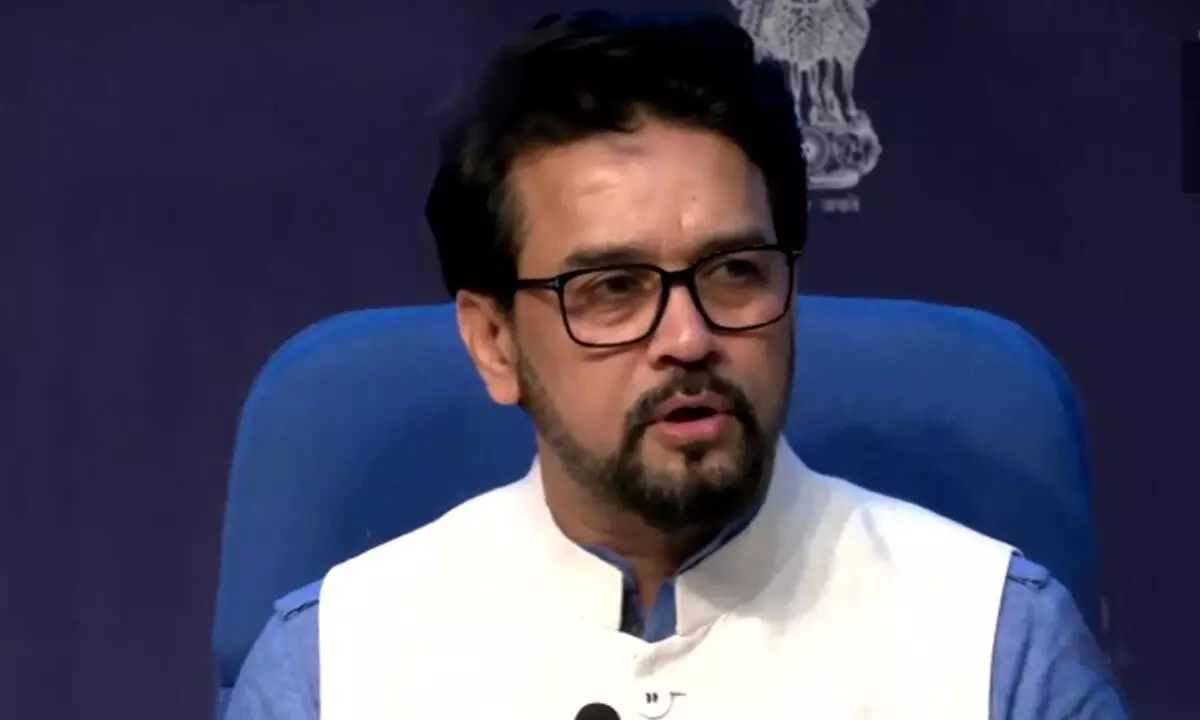Just In

Sports Minister Anurag Thakur
The government on Wednesday gave its clearance to the Cinematograph (Amendment) Bill 2023, which proposes to introduce more categories for film certification and also brings in stricter penal provisions to prevent film piracy.
New Delhi: The government on Wednesday gave its clearance to the Cinematograph (Amendment) Bill 2023, which proposes to introduce more categories for film certification and also brings in stricter penal provisions to prevent film piracy.
It is likely to be presented during the Monsoon session of Parliament, sources in the know of things said.
The proposed bill suggests imprisonment ranging from three months to three years, and a fine of at least Rs 3,00,000 which may extend to a sum of up to 5 per cent of the audited gross production cost of the film, to prevent film piracy.
According to sources aware of the developments, the Union cabinet, which met earlier on Wednesday, is learnt to have okayed the Cinematograph (Amendment) Bill 2021, under which, the new film certification categories will include "U" or universal, U/A 7+ , U/A 13+, and U/A 16+, besides an A rating for content restricted to adults.
Currently, under the Indian Cinematograph Act, three categories of film certification exist -- unrestricted public exhibition or U, parental guidance required for children under 12 or "U/A", and adult films or "A".
Information and broadcasting Minister Anurag Thakur told mediapersons after the cabinet meeting that wide ranging consultations were held before bringing the bill to cabinet.
He, however, did not reveal much details about the other provisions of the bill.
The proposed amendments allowing sub-categorisation for film certification purpose, appear to be in line with the age-based restrictions recently implemented for over-the-top (OTT) content providers under the Information Technology (Intermediary Guidelines & Digital Media Ethics Code) Rules, 2021 (Intermediary Rules).
On June 18, 2021, the government had issued a notification seeking public comments to the Cinematograph (Amendment) Bill 2021, proposing two further amendments to the Cinematograph Act than those already proposed in 2019.
These were introduction of age-based categories for film certification and penal provisions imposed for film piracy.
Government had earlier in February 2019, introduced the Cinematograph (Amendment) Bill, 2019 in Rajya Sabha, with the aim of penalising rampant film piracy.
The 2019 legislation proposed prohibiting a person from using a recording device to make a copy or transmit a film, without written authorisation of the copyright owner of the film.
It aimed to tackle film piracy by including the penal provisions for unauthorised cam-cording and duplication of films in an exhibition facility.
However, after the Parliamentary committee on IT had made a slew of amendments in the 2019 bill, the government brought its 2021 version, which has now been cleared by the Union cabinet.
In the 2021 bill though, the penal provisions have been amended slightly and the penalties for an offence of film piracy are -- imprisonment ranging from three months to three years and a fine of at least Rs 3,00,000 which may extend to a sum of up to 5 per cent of the audited gross production cost of the film.
The Cinematograph (Amendment) Bill 2021 had earlier caused a lot of controversy, when the government had sought comments on it from stakeholders in June 2021, as the Indian film industry had felt that it threatens the autonomy of the CBFC and film makers.
They were of the opinion that by giving revisionary powers to the Centre (one of the amendments proposed in it), they will be left powerless and will be exposed to vandalism, harassment as well as mob-censorship.
They had even alleged that it was curtailment of freedom of expression.
It remains to be seen whether the bill cleared by the Union Cabinet on Wednesday, contains the controversial clause or not.

© 2024 Hyderabad Media House Limited/The Hans India. All rights reserved. Powered by hocalwire.com






